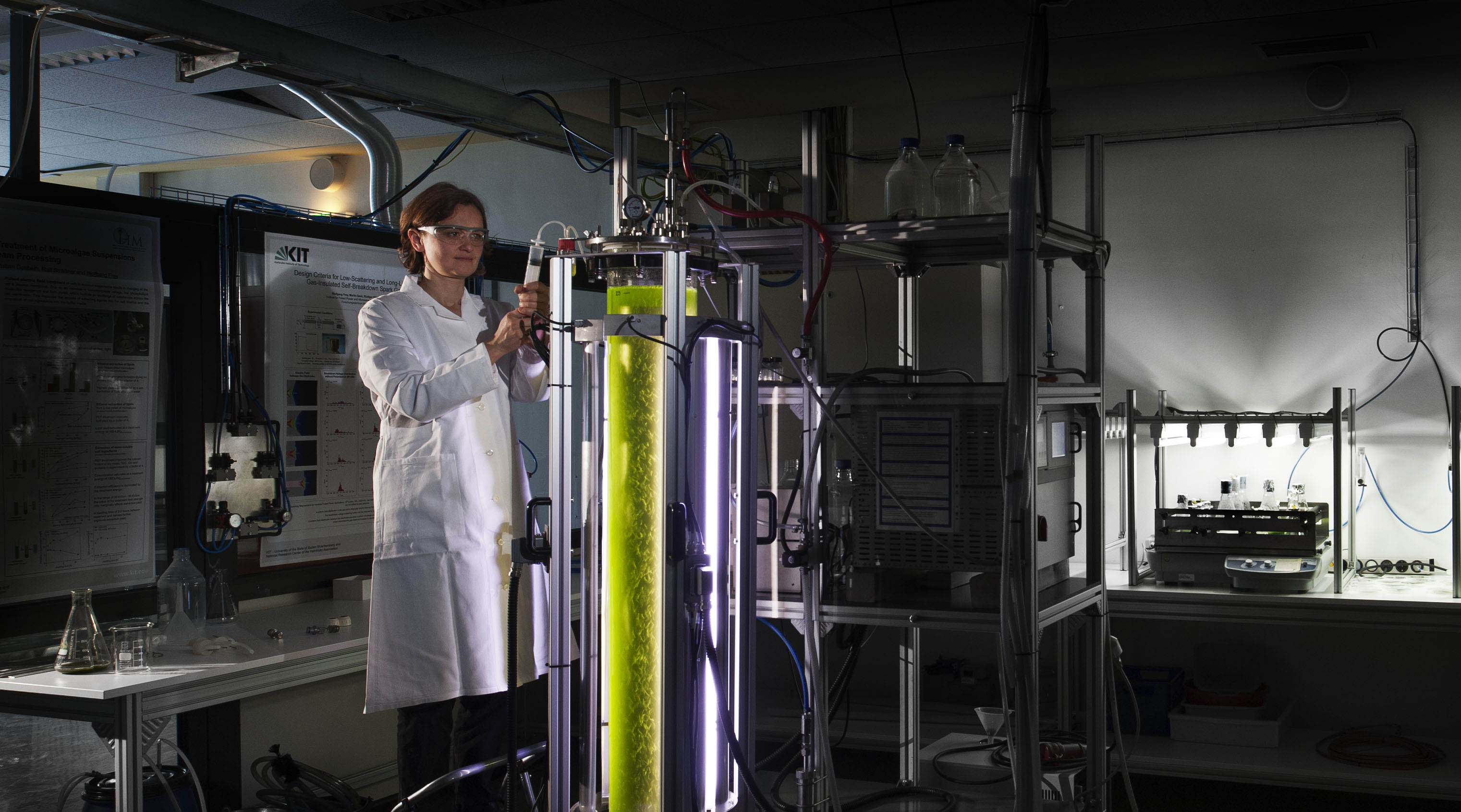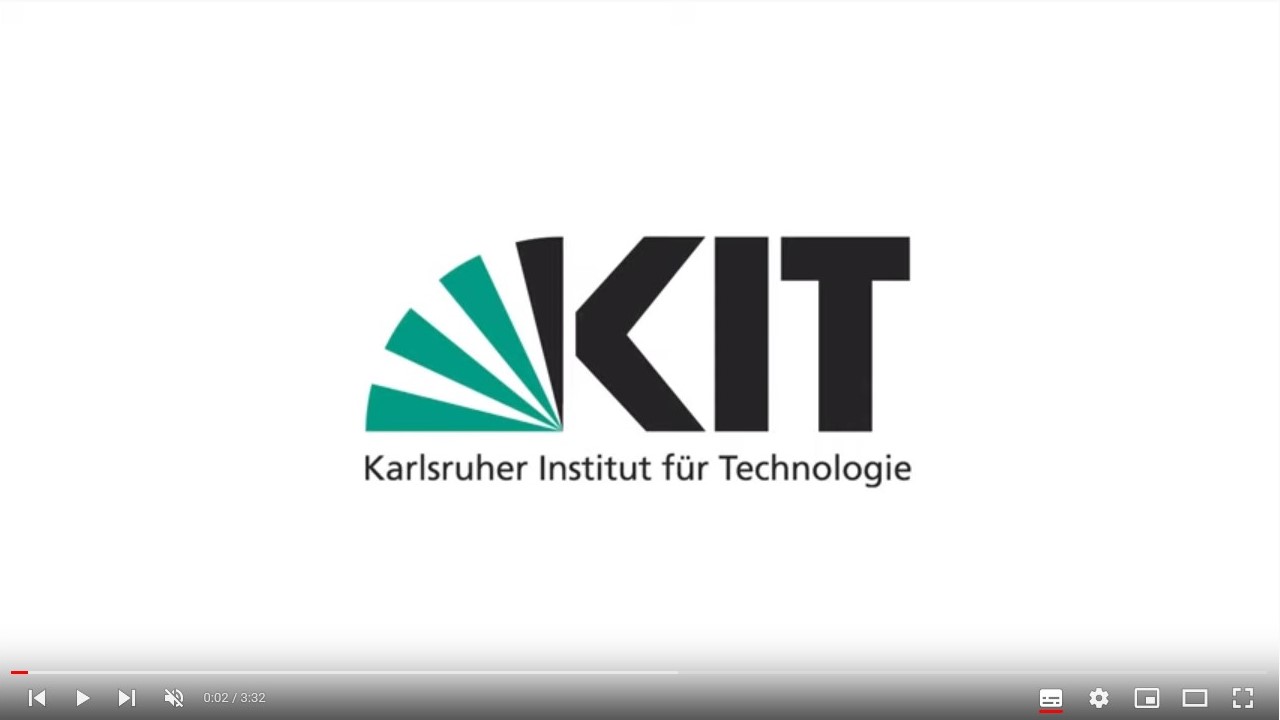Degree: Master of Science (M.Sc.)
Regular program length: 4 semester (full-time program)
Credit points (ECTS): 120 credit points
Language of instruction: German
Higher semester: no
Higher semester: winter and summer term
First semester: September 30 for winter term, March 31 for summer term
Higher semester: September 30 for winter term, March 31 for summer term
First semester: July 15 for winter term, January 15 for summer term
Higher semester: July 15 for winter term, January 15 for summer term
Program details
Program structure
In the master's degree program in Bioengineering, you will deepen and expand the knowledge acquired in the bachelor's degree program and at the same time set your own specialist focus. The program provides you with theoretical and practical knowledge that allows you to apply process engineering principles to biological material systems. This distinguishes it from the natural science programs, biotechnology or molecular biotechnology, which primarily deal with the utilization of biological principles. The main focus at KIT is on biotechnological procedures and processes that implement the industrial utilization of biological systems. In the master's thesis, you provide proof that you can work on a technical problem independently and within a limited period of time using scientific methods that correspond to the current state of research. The compulsory internship provides you with insights into the practical work of an engineer.
You will complete the compulsory subject Core Competencies (12 credit points), consisting of Process and Plant Design in Biotechnology and Thermodynamics in Bioengineering. You will earn a further 22 credit points in the compulsory subjects
- Process Engineering (at least 6 and up to 16 credit points) and
- Computer-Aided Methods (at least 6 up to 16 credit points)
In the compulsory elective area, you will take modules worth 40 credit points. Interdisciplinary qualifications complete your curriculum.
Qualification profile of the graduate
The focus of bioengineering is on process engineering in the context of an industrial, engineering-driven application of biological and biotechnological principles. In this way, bioengineering differs from natural sciences programs, biotechnology or molecular biotechnology, which deal primarily with the utilization of biological principles. Bioengineers make a crucial contribution to the development of interdisciplinary approaches for creating an energetically and materially sustainable, post-fossil economy.
The Master's program provides extensive detailed knowledge in engineering, mathematics and natural sciences, which enables graduates to apply process engineering principles to biological material systems. The Master's degree qualifies graduates to work scientifically and act responsibly within their professional activity and in the society.
Based on the Bachelor's program, the compulsory program in the first year focuses on advanced methodical and qualified fundamental knowledge with a main focus on biotechnological procedures and processes that make an industrial utilization of biological systems possible. This knowledge is further advanced within two specialized courses elected by the students. One of these specialized courses has to deal with aspects of biotechnological material systems.
In the scope of the Master's thesis, students prove their ability to work on a problem within their field of expertise independently and in a defined time frame using scientific methods that correspond to the current state of research. In addition, an internship provides insight into the fields of activity of an engineer.
Graduates are qualified to analyze and solve problems using scientific methods and to abstract and formulate complex problems. They are also able to develop new methods, processes and products. Graduates are qualified to combine knowledge from various professional areas and to familiarize themselves systematically with new tasks. They can reflect non-technical impacts of engineering activities and consider those impacts by acting responsibly.
Career prospects
Due to the increasing use of biological materials and processes in product development and manufacturing, a degree in bioengineering offers you good career opportunities in many sectors. In addition to the 'white', 'red' and 'green' biotechnology sectors, which cover the fields of the biological-chemical, medical-pharmaceutical, agricultural and food industries, there are other possible fields of work in the energy and electronics sectors. With a good master's degree, you have a good chance of obtaining a doctorate with the prospect of interesting tasks in research. If you want to start your own business with your own idea, you will also find support at KIT.
Characteristic features of the degree program
Characteristic features of the Bioengineering M.Sc. at KIT
own department with a wide range of courses
master's orientation phase
many elective options
research-oriented teaching
internationally networked (CLUSTER, CESAER, Eucor...)
support for business start-ups
support in organizing your studies from the Student Advisory Service and your academic advisor
What KIT has to offer
- central campus close to the city forest and right next to the city center
- 24-hour library offering single and group working places
- wide range of inexpensive catering options (dining hall, cafeteria, Koeri and Pizzawerk)
- numerous interdisciplinary offers for personal and professional development, e.g. Lernlabor, Schreiblabor and Perspektivenlabor
- study abroad, e.g. via Erasmus
- excellent university sports facilities with a large selection of sports
- comprehensive cultural offerings with university orchestras, choirs and theater groups
- extensive support for career entry and self-employment
- internationally oriented degree programs and diverse exchange programs
- modern laboratories and practical teaching methods
- Lernraum app
- diverse student initiatives, clubs and opportunities to actively participate in campus life
- stay in touch after graduation via the alumni network
Admission and language requirements
Admission requirements
The requirements for admission to the master's degree program in Bioengineering are based on the current admission regulations:
- bachelor's degree
a bachelor's degree (or at least an equivalent degree) in Bioengineering or a degree program with essentially the same content at a university, university of applied sciences, university of cooperative education or at a foreign university. The program must have been completed within a standard period of study of at least three years and with a minimum number of 180 ECTS credits. - minimum knowledge and minimum achievements in the following areas
- mathematical and scientific fundamentals amounting to at least 35 credit points, including at least 10 credit points in mathematics
- engineering fundamentals amounting to at least 15 credit points
- thermodynamics & transport processes amounting to at least 15 credit points, of which at least 5 credit points are in the area of transport processes
- process engineering fundamentals amounting to at least 12 credit points
- biology and biotechnology worth at least 15 credit points
- mathematical and scientific fundamentals amounting to at least 35 credit points, including at least 10 credit points in mathematics
Important: If minimum achievements amounting to a maximum of 15 credit points are missing, admission can be granted on the condition that achievements are made up within the first three semesters of the master's degree program.
Language requirements and certificates
For the master's degree program in Bioengineering, you need sufficient knowledge of the German language. Your German language skills must correspond to at least level C1 of the Common European Framework of Reference for Languages (CEFR).
Proof of sufficient German language skills
Your school-leaving certificate is sufficient proof of your German language skills if
- you obtainted it at a German-speaking school in Germany or abroad
- you are a graduate of a bilingual secondary school in Germany or abroad and have passed a bilingual German examination, such as the AbiBac or the Gemischtsprachiges International Baccalaureat (GIB)
- you obtained your degree at a foreign school, but there is another official agreement with the respective country on the recoginition of your school-leaving certificate or language certificate as proof of language proficiency for university studies in Germany
A complete list of foreign school-leaving and language certificates that are recognizes as proof of sufficient German language skills can be found on the webste of the Kultusministerkonferenz (Standing Conference of the Ministers of Education and Cultural Affairs of the Länder in the Federal Republic of Germany).
If you have not obtained your higher education entrance qualification (HZB) at one of the above-mentioned institutions, you must provide a separate language certificate - regardless of your nationality. Only the following are accepted
- the passed „Prüfungsteil Deutsch“ of the Feststellungsprüfung,
- the passed DSH with an overall result DSH-2,
- the passed TestDaF level 4 in all four parts of the examination (reading comprehension, listening comprehension, written expression, oral expression)
- a comparable, recognized certificate of sufficient German language skills
To find our which other recognized certificates can be accepted by KIT as comparable, please contact
- as a German or German-equivalent applicant: Studierendenservice
- as an applicant with non- EU citizenship: International Students Office
Please note:
Language certificates are extremely important application documents that can prevent your enrollment if you do not submit them on time. Therefore, check early on in the application process whether you have the necessary language certificates for your degree program and, if necessary, plan to take one of the language tests mentioned above. The deadline by which you must submit language certificates corresponds to the enrollment deadline stated in your admission offer. In justified cases, you can apply for an extension of this deadline. The extension can be granted until the start of the lecture period at the latest.
Application portal
Application for the 1st semester
Application for a higher semester
Contacts
Student advisor
Student advisory services (ZSB)


Karlsruher Institut für Technologie (KIT)
Zentrale Studienberatung (ZSB)
Engelbert-Arnold-Str. 2
76131 Karlsruhe
Karlsruher Institut für Technologie (KIT)
Studierendenservice
Kaiserstr. 12
76131 Karlsruhe
First point of contact for international applicants
Karlsruher Institut für Technologie (KIT)
International Students Office (IStO)
Adenauerring 2
76131 Karlsruhe
Printed matter
Module handbook
Statutes and regulations
| Titel | Stand | Download |
|---|---|---|
| 2024 KIT 029 Satzung für den Zugang zu dem Masterstudiengang Bioingenieurwesen am Karlsruher Institut für Technologie (KIT) | 29.07.2024, veröffentlicht 29.07.2024 |
| Titel | Stand | Download |
|---|---|---|
| 2025 KIT 033 Studien- und Prüfungsordnung des Karlsruher Instituts für Technologie (KIT) für den Masterstudiengang Bioingenieurwesen | 20.05.2025, veröffentlicht 21.05.2025 |
Teaching calendar
WT 2024/25
10-21-2024 to 02-15-2025
ST 2025
04-22-2025 to 08-02-2025
WT 2025/26
10-27-2025 to 02-21-2026
ST 2026
04-20-2026 to 08-01-2026
WT 2026/27
10-26-2026 to 02-20-2027
ST 2027
04-19-2027 to 07-31-2027
WT 2027/28
10-25-2027 to 02-19-2028
ST 2028
04-18-2028 to 07-29-2028
Lectures will not take place:
- From 12-24 to 01-06
- the week after Pentecost
- on all public holidays in the state of Baden-Wuerttemberg





